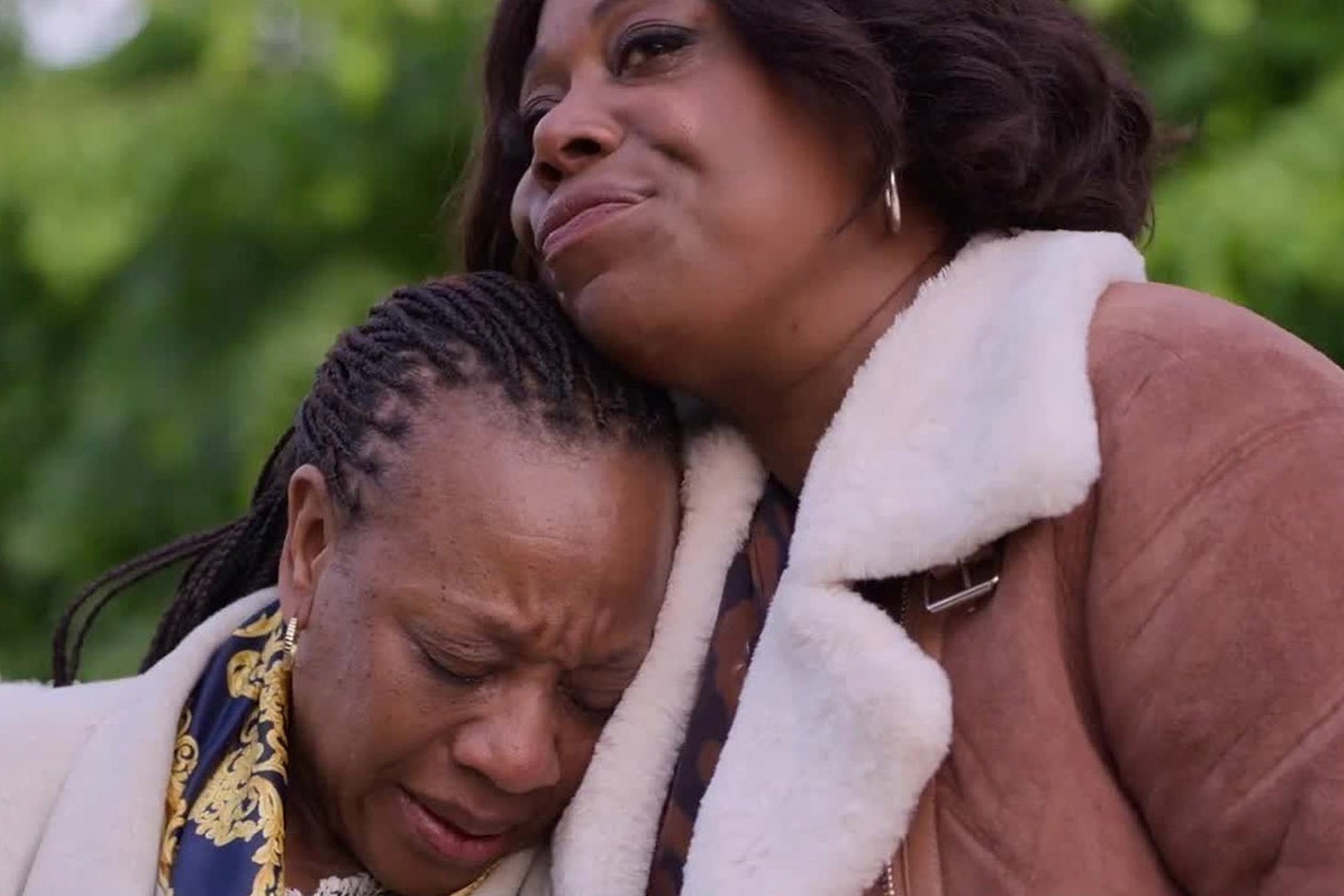One of the best reasons to see a movie in a movie theater is the feeling of laughter in a crowd, the vocal and immediate affirmation that, regardless of how many viewing companions you walked through the door with, you are not alone. But in Mike Leigh’s Hard Truths, the laughter dies out the longer you watch. Pansy (Marianne Jean-Baptiste), a middle-aged mother with a taciturn husband and a layabout son, wakes each morning with a start, as if the mere act of reentering the conscious world is an unwelcome shock, and spends her days raging at the world, picking petty fights with sales clerks—“Fix your face!” she yells at one startled supermarket cashier—and ranting about offenses that are only visible to her eyes. Her targets are so arbitrary and inoffensive that she comes off for a while like a stand-up comic in permanent rage mode; in the midst of a diatribe against the way a neighbor dresses her child, she blurts, in an exasperated West Indian lilt, “What’s a baby need pockets for?” But the audience’s laughter is rooted more in shock than in agreement, and the more Pansy rages, the more we start to feel that she’s stuck in that mode, either because her anger is so great that it overwhelms her other feelings or because she uses it to keep them at bay. When she unloads on her husband, Curtley (David Webber), at the end of a particularly aggravating day, she blazes through grievances with so little preamble that it’s close to gibberish, and he just sits and waits for her to finish so he can go back to his dinner. It’s not so funny at all.
Hard Truths eventually drops a few clues as to the sources of Pansy’s misery, but it also suggests that she’s in the midst of an ongoing mental health crisis, one that she’d never dream of admitting to, let alone addressing. Instead, she blankets everyone around her in her unhappiness, and it’s reflected back at her. She and Curtley barely talk, and her adult son, Moses (Tuwaine Barrett), curls up in his bedroom reading picture books about airplanes. He doesn’t have a job and has given up looking for work, so when she forces him to leave the house, he just trudges through the streets with his eyes downcast and his headphones on. A pair of neighborhood boys, spying an easy target, push him around and mock his weight, airily yelling, “Don’t cut your wrists!” as they bound off in search of their next target.
Life isn’t much easier on Pansy’s sister, Chantelle (Michele Austin), but she’s better equipped to take it in stride. Although she lives alone, she’s far less isolated, working in a beauty shop where she swaps gossip all day, and when her daughters, Kayla (Ani Nelson) and Aleisha (Sophia Brown), come over, her living room is a tumult of conversation and jokes that they know each other too well to bother finishing. The daughters endure their own hardships—one pitches her boss on a new line of beauty products only to receive a scathing and unwarranted dismissal—but they’ve got the emotional resources to handle setbacks, even if it involves a smidge of denial. Everything hits Pansy hard, from microaggressions to the gentle prod of a dental assistant’s probe, which makes her wince in pain that’s not entirely physical. Although there’s plenty of cruelty in it, Hard Truths isn’t a cruel movie, but there’s something a little brutal about the abruptness with which Leigh cuts from the raucous laughter of Chantelle and her daughters to the dead-silent room where Chantelle is working on her sister’s hair, sucking her teeth as she looks over the spot where Pansy has rubbed her scalp raw.
After the historical sweep of Mr. Turner and Peterloo, Hard Truths returns Leigh to the intimacy of the domestic sphere, and it’s possible that back-to-basics approach, evocative of older Leigh movies like Naked and Secret & Lies (which introduced the world to Jean-Baptiste and earned the actress her first Oscar nomination), has led some to underestimate its achievement: Both the Cannes and Venice film festivals rejected the movie, which eventually premiered in Toronto, and the glitziest awards bodies have all overlooked Jean-Baptiste thus far—although, in a rare moment of unanimity, the New York Film Critics Circle, Los Angeles Film Critics Association, and the National Society of Film Critics all awarded top acting honors to her titanic performance. (It’s also made dozens of Top 10 lists, including both my own and that of Slate movie critic Dana Stevens.) It’s a deceptively simple movie, shot with unobtrusive sensitivity by Leigh’s longtime collaborator Dick Pope, who died last year. But volumes play out on Jean-Baptiste’s face as her furor ebbs and the terrible fear and loneliness surge to the front. Her prickly castigation poisons everyone around her, but it’s better than what might fill that space if she let it.
On the anniversary of their mother’s death, the sisters go to visit their mother’s grave, and an argument breaks out: Chantelle wants to honor her memory; Pansy says that the dead are dead and talking to them is just wasted breath. When Chantelle, who’s just about at the end of her rope, asks why her sister has to be so angry all the time, Pansy responds with a question that only sounds rhetorical: “How do you want me to be?” Even if Chantelle could provide an answer, it’s doubtful Pansy could transform herself, but at least she’d have something to work toward, a vision of a life, any life, different than the one she lives. As it is, all she can do is gaze out toward her own backyard, stepping briefly into the sun before she’s pulled back inside.

